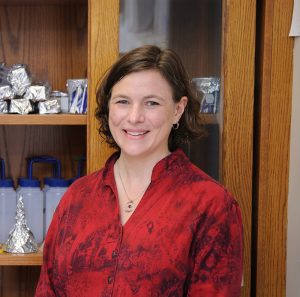
TUSCALOOSA, Ala. — With two grants totaling more than $4 million, The University of Alabama leads a national effort to continue and expand undergraduate science courses that engage students in active research.
Dr. Laura K. Reed, UA associate professor of biological sciences, is the director of the Genomics Education Partnership, a collaboration of more than 100 institutions that reaches about 1,300 students annually, many at minority-serving institutions.
The GEP uses curriculum on molecular biology and bioinformatics to engage students in authentic research ultimately published in scientific journals.
“The University of Alabama is leading the nation in one of the top undergraduate research programs,” Reed said. “Our work with the Genomics Education Partnership is consistent with the University’s dedication to active learning and broadening undergraduate research opportunities.”
The project is supported by two recently awarded five-year grants. A $2.2 million award from the National Institutes of Health and a $1.99 million grant from the National Science Foundation will expand the GEP to more institutions and build regional communities of professors who can support and mentor each other through internet-enabled interaction.
The funding will also support the publication of the students’ work through the Journal of Micropublications, which allows studies with smaller data sets than traditional experiments.
The GEP started in 2005 at Washington University in St. Louis by renowned biologist Dr. Sarah Elgin, who has passed on leadership of the program to Reed. Washington University in St. Louis will remain critical to the success of the program, Reed said. The NSF grant also involves leading collaborators at Linfield College in Oregon and California Polytechnic State University in San Luis Obispo, California.
Since Elgin developed the program, the GEP expanded across the country to institutions of all sizes and missions. In fact, more than 90 percent of the participating institutions are not major research universities. The program allows students at smaller colleges and community colleges greater opportunity to do meaningful research, Reed said.
The curriculum is web-based, so there are no fees for students, and the grants cover training for professors, so there is no cost for institutions to join GEP.
The program employs Course-based Undergraduate Research Experiences, abbreviated as CUREs, to allow students to participate in genomics research. Students learn to take raw sequence data to high quality finished sequence and to annotate genes and other features, leading to analysis of questions in genomics and research publication.
“The assessment data shows that students in these courses feel like real scientists,” Reed said. “The power of this program is students see the whole scientific process, and they are more likely to stick with science after the opportunity to engage with these experiments.”
Through the program, students develop models for the genes of different species of fruit flies, a task that requires integrating and analyzing computational and experimental data to come up with the best explanation for the evolutionary history of the genes.
The grants will help expand the work to other models such as other insects, invertebrate animals and plants, Reed said.
The program has trained professors through development workshops in St. Louis, but the new grants will allow virtual training along with regional workshops near clusters of participating institutions.
The goal of the new grants is to nearly double the number of professors teaching the curriculum so more students can engage in the research.
At UA, Reed has taught GEP as an upper-level course, with student co-authors on papers published in major scientific journals. Each institution can decide how best to offer the curriculum, so some of the classes are designed for freshman or non-majors, she said.
“The strategies are different, but all students in the program make genuine scientific contribution,” Reed said.
Contact
Adam Jones, UA communications, 205-348-4328, adam.jones@ua.edu
